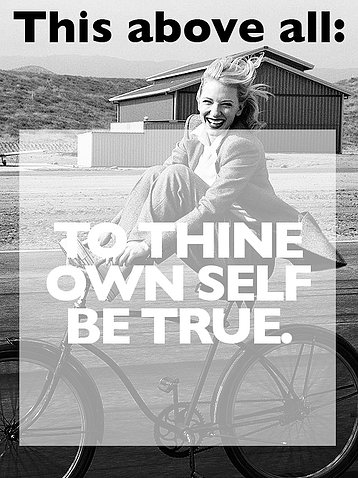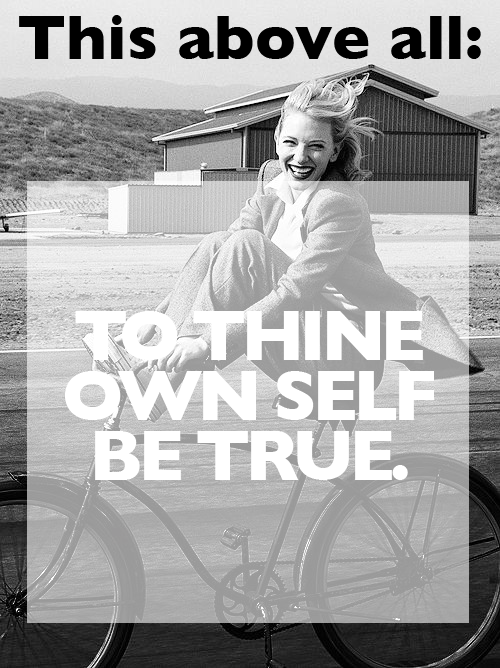 My sixth-grade lesson on how not to build authenticity started with a jacket. It was a silver metallic jacket, lined with neon fleece. Absolutely hideous. But I put it on anyway as I walked to the bus stop when I was in sixth grade. Why did I wear it when I knew deep down that it was probably the lamest jacket I had ever worn?
My sixth-grade lesson on how not to build authenticity started with a jacket. It was a silver metallic jacket, lined with neon fleece. Absolutely hideous. But I put it on anyway as I walked to the bus stop when I was in sixth grade. Why did I wear it when I knew deep down that it was probably the lamest jacket I had ever worn?
Because of the label: Patagonia. This label would tell the world who I really was: an explorer and a mountaineer.
That jacket ate at me all day long as I tried to feel and look confident in it. The metallic material caught the sun’s reflection and blinded anyone who came near me. It was a disaster, and I never wore that jacket again--the label wasn’t worth it. It didn’t prove anything about me other than my willingness to sell out my own instincts for a label. And that’s what felt so crappy. Somebody, somewhere liked that jacket--at least I hope so, or why else would a company manufacture such a product? It just wasn’t me.
It's Time to Grow Up
We all have similar, and awkward, stories from our adolescence, but, hopefully, now as adults we have a good idea of who we are. So why do we continue to do business by the label, even if it doesn’t fit? Why is it so hard to say no to excess or an awkward process? It’s time to shed the facade and get real. Figure out who you are as a business, tell it, and own it.
This is authenticity, and here are six ways to build authenticity in your business in a way that will last.
#1 - Create the "Our Story" Page.
Warby Parker is a direct-to-consumer eyewear company that is growing rapidly. If you go to their website they have a link in their main navigation called “Our Story.” Click on it and you can learn about their history, company culture and more. You can even “Meet the Founders.” Customers are let in to learn details about the company and its employees that gives them a sense of the people behind the product.
The more a customer knows about the company, the more they feel connected and invested in the brand. Your story is half the product or service you offer.
The definition of authentic is “of undisputed origin; genuine.”
People will relate to your journey: what inspired you, mistakes you made, problems you solved, people you met, advice you took (and didn’t take). Then bring them up to speed, and tell them where you are now and where you’re headed. Share your vision, your values, and your evolution. You’ll inspire them to stick around, and share your services with their network.
Create an "Our Story" page on your website, and make sure your current and potential customers hear your story too--they're more likely to believe in you, and they'll spread the word.
#2 - Reveal the Man Behind the Curtain
A new apparel company, Everlane, has articles and videos online where you can see and learn about their factories which are located in the U.S, China, Italy, Scotland, and Spain. Customers trust Everlane’s values and quality because they are given a personal tour on how and where the clothing is made.
Let people see your process, the nuts and bolts of how your company works. Interview the employees that make it happen, and show people how and where everything is created. You can easily do this through blog posts and email updates. Show people how you dominate Facebook, get out of the red, or maintain loyal customers. Opening up will earn you serious trust points not only with your customers but within your industry.
And while you're opening up the doors, throw out that sales script you've been using. Let your customers and your colleagues really get to know you and why you're in the business you're in.
#3 - "You Can't Do Stuff That's Stupid"
Speaking of transparency, Michael Lazerow recently commented in an interview with Forbes that “we’re in a trust revolution where everything is transparent.” The internet will eventually catch up to all of us, and it’s not easy to hide any more--for better or for worse. In order to gain trust among the public “you can’t do stuff that’s stupid,” says Lazerow. It’s tough to recover from a PR blunder, a recalled product, or fraud. Be smart, stay on your toes, and remember who you are. Seriously. It’s the only way to gain and keep trust. Be proactive, define your values, and take ownership.
You could include a list of company values on your "Our Story" page as a reminder to you, your employees, and your customers. Let your customers hold you to those core values that brought them to you in the first place.
#4 - Focus on Cooperation (Not Self-Interest)
Are you more worried about beating the competition than how successful your industry is overall? Do you secretly hope for others' failures? Authentic leaders have confidence in their success, and the success of everyone else around them. Rather than focus on selling, focus on contributing what you do/know best. The good news is is that as you work in cooperation with others everyone is likely to grow together. Cultivate contribution.
A good way to start cultivating cooperation is to listen to your employees, your customers, and even your competitors. Create networks and groups where information and advice can be easily shared.
- Create and share a "tools for successful business practices" folder on the cloud.
- Invite customers into your office often to get their feedback, and to get to know them personally.
- Organize a local industry after-work happy hour where you can discuss current trends and how to implement new technologies and/or strategies.
Go ahead, host a party!
#5 - Be the Real Deal. Be Genuine.
We all know talk is cheap. All of us. That means your past, current, and potential customers know it too. Make sure that you can deliver on promises, and if an honest mistake occurs, own it and fix it. Now. If you claim to have a superior product or service, your customers should see that you invested time and materials to match. Put your money where your mouth is. It all has to match up at the end of the day--every day. Masks are expensive to maintain in the long run.
# 6 - This Above All : To Thine Own Self Be True
This was a father’s advice to a son leaving home for studies abroad. Most of us could recite this advice by heart. In this Shakespeare play, the son does not heed his father’s advice, and eventually dies in a duel with a once-dear friend, Hamlet. Whoa. Obviously Shakespeare valued authenticity as one of the highest of virtues. So what does Shakespeare know about becoming a profitable business owner with relationships of trust?
To thine own self be true. Find your niche. Find your strength. You’ll receive all sorts of advice, and attend seminars to help your business become more profitable. But, in the end, none of it is worth anything if you risk misapplying valuable information because you’re trying to be everyone else.

Not only does it feel good to be transparent, and to be the business you really are, but it will also pay off when customers stick around for a long time and bring all of their friends with them because they trust you.
How is your business opening up to customers and within its industry? Have you experienced any results, positive or negative, when you share information with colleagues and clients?
As you build authenticity for your business, both customers and other companies will trust your voice and expertise--and they'll keep coming back.
How would you like to build authenticity for your business? What does it mean to you to build authenticity?
Want to Read Other Articles Like This One?
Don't forget to subscribe to our blog and get posts like this one delivered to your inbox each week or month.



















